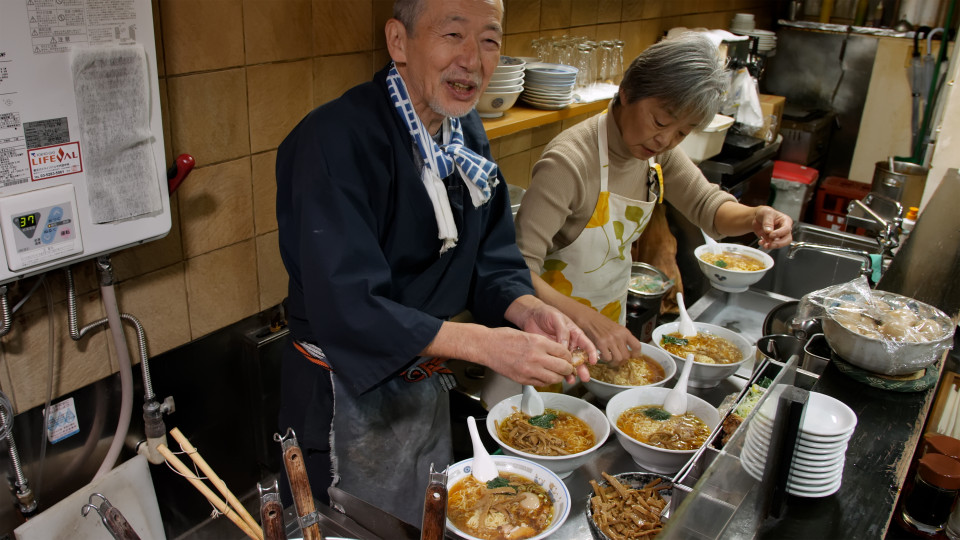Following a warm reception on the international film festival circuit, an award-winning documentary centered on an unconventional Tokyo ramen shop recently hit theaters in the Japanese capital.
"Come Back Anytime" tells the story of self-taught ramen master Masamoto Ueda and his wife Kazuko, who ran the shop Bizentei together for more than 40 years.
While the film features mouth-watering footage of the shop's signature noodle dishes, it focuses on the relationships between Ueda and some of his regular customers, who came to form a closely knit community.
The film's American-born, Tokyo-based director and cinematographer, John Daschbach, had been one such customer. After visiting Bizentei for several years, he wanted to show the bonds among its customers and the gregarious ramen master, whose hospitality extended to organizing weekend excursions for his regulars.

Daschbach took part in a number of the trips, accompanying the master on fishing expeditions, foraging for Japanese mountain yams and visiting his countryside vegetable garden outside Tokyo.
"I wanted to make a film in Japan for some time before it hit me that it should be about this man, this restaurant and this unique community of regulars who gathered there," Daschbach said.
"There was something special about Bizentei in the way it became like a family for people living in a big city."
Although aspects of the relationship between Bizentei's owners and customers were out of the ordinary, the restaurant also reflected a quintessential part of Tokyo's culinary and social fabric, according to the director.
"It shows the important part that small shops play in Tokyo," he said. "It might not always be a ramen shop, it can be an izakaya (Japanese pub) or a yakitoriya (grilled chicken shop). The mom-and-pop store culture in Tokyo is something you don't see in many big cities around the world."
After a year of filming, "Come Back Anytime" was completed in 2021 and screened at festivals including Toronto-based Hot Docs and the Melbourne International Film Festival. Along with glowing reviews, it garnered awards including the best documentary prize at the Sonoma International Film Festival in California.
It was later picked up by streaming services in several countries, but getting accepted to Japanese film festivals or finding a local distributor continued to prove difficult.
"I started to think it might not be unique enough for Japanese viewers," Daschbach said.
But the positive response at private screenings, some involving Bizentei customers and their friends, convinced Daschbach and producer Wataru Yamamoto that the film would also appeal to people in Japan.
Yamamoto's persistence seeking a distributor eventually paid off, and "Come Back Anytime" had its first regular runs at two Tokyo theaters last month. It is screening at the Theater Guild cinema in central Tokyo's Daikanyama neighborhood through Sunday.
"As an outsider, I had some idea of how it would be received overseas, but it's nice to find out that Japanese audiences have been interested too," Daschbach said.
Viewers hoping to taste ramen master Ueda's creations will have to satisfy their appetites elsewhere, however. Since shuttering Bizentei in March 2023, he has been enjoying his retirement by traveling around Japan and spending time at his beloved vegetable garden, Daschbach said.
Related coverage:
FEATURE: Man fills void in rural Japan city by opening movie theater
FEATURE: Edible bug businesses 'hearing crickets' at crossroads in Japan
FEATURE: New documentary gives a human face to disability in Japan
 By Sean Miyaguchi,
By Sean Miyaguchi,









